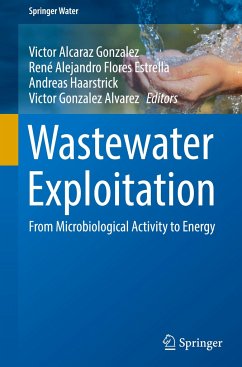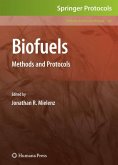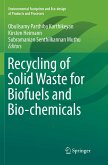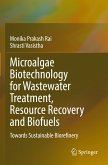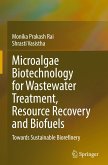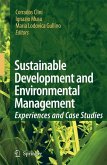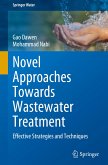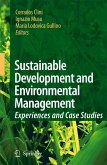Wastewater Exploitation
From Microbiological Activity to Energy
Herausgegeben:Alcaraz Gonzalez, Victor; Flores Estrella, René Alejandro; Haarstrick, Andreas; Gonzalez Alvarez, Victor
Wastewater Exploitation
From Microbiological Activity to Energy
Herausgegeben:Alcaraz Gonzalez, Victor; Flores Estrella, René Alejandro; Haarstrick, Andreas; Gonzalez Alvarez, Victor
- Gebundenes Buch
- Merkliste
- Auf die Merkliste
- Bewerten Bewerten
- Teilen
- Produkt teilen
- Produkterinnerung
- Produkterinnerung
With all the current efforts to use non-fossil sources as a starting point for future energy solutions, consideration is also being given to using microbial activities as a direct or indirect source of energy production. This ranges from the use of algae as biomass or as H2 producers, anaerobic microorganisms to produce methane, hydrogen, and even electricity directly.
This book deals with both theoretical and technical possibilities of using anaerobic microorganisms in combination with wastewater as a substrate source to produce biofuels and bioenergy in the form of biomass, CH4 and H2 as…mehr
Andere Kunden interessierten sich auch für
![Biofuels Biofuels]() Biofuels105,99 €
Biofuels105,99 €![Recycling of Solid Waste for Biofuels and Bio-chemicals Recycling of Solid Waste for Biofuels and Bio-chemicals]() Recycling of Solid Waste for Biofuels and Bio-chemicals121,99 €
Recycling of Solid Waste for Biofuels and Bio-chemicals121,99 €![Microalgae Biotechnology for Wastewater Treatment, Resource Recovery and Biofuels Microalgae Biotechnology for Wastewater Treatment, Resource Recovery and Biofuels]() Monika Prakash RaiMicroalgae Biotechnology for Wastewater Treatment, Resource Recovery and Biofuels89,99 €
Monika Prakash RaiMicroalgae Biotechnology for Wastewater Treatment, Resource Recovery and Biofuels89,99 €![Microalgae Biotechnology for Wastewater Treatment, Resource Recovery and Biofuels Microalgae Biotechnology for Wastewater Treatment, Resource Recovery and Biofuels]() Monika Prakash RaiMicroalgae Biotechnology for Wastewater Treatment, Resource Recovery and Biofuels89,99 €
Monika Prakash RaiMicroalgae Biotechnology for Wastewater Treatment, Resource Recovery and Biofuels89,99 €![Sustainable Development and Environmental Management Sustainable Development and Environmental Management]() Sustainable Development and Environmental Management121,99 €
Sustainable Development and Environmental Management121,99 €![Novel Approaches Towards Wastewater Treatment Novel Approaches Towards Wastewater Treatment]() Gao DawenNovel Approaches Towards Wastewater Treatment129,99 €
Gao DawenNovel Approaches Towards Wastewater Treatment129,99 €![Sustainable Development and Environmental Management Sustainable Development and Environmental Management]() Corrado Clini / Ignazio Musu / Maria Lodovica Gullino (eds.)Sustainable Development and Environmental Management121,99 €
Corrado Clini / Ignazio Musu / Maria Lodovica Gullino (eds.)Sustainable Development and Environmental Management121,99 €-
-
-
With all the current efforts to use non-fossil sources as a starting point for future energy solutions, consideration is also being given to using microbial activities as a direct or indirect source of energy production. This ranges from the use of algae as biomass or as H2 producers, anaerobic microorganisms to produce methane, hydrogen, and even electricity directly.
This book deals with both theoretical and technical possibilities of using anaerobic microorganisms in combination with wastewater as a substrate source to produce biofuels and bioenergy in the form of biomass, CH4 and H2 as well as the corresponding power densities and electricity quantities in economically justifiable processes. Unique process facilities are widely addressed; however, special interest is also placed in biorefinery and circular economy related concepts. The theoretical background as well as application examples are presented.
This book deals with both theoretical and technical possibilities of using anaerobic microorganisms in combination with wastewater as a substrate source to produce biofuels and bioenergy in the form of biomass, CH4 and H2 as well as the corresponding power densities and electricity quantities in economically justifiable processes. Unique process facilities are widely addressed; however, special interest is also placed in biorefinery and circular economy related concepts. The theoretical background as well as application examples are presented.
Produktdetails
- Produktdetails
- Springer Water
- Verlag: Springer / Springer Nature Switzerland / Springer, Berlin
- Artikelnr. des Verlages: 978-3-031-57734-5
- 2024
- Seitenzahl: 392
- Erscheinungstermin: 20. Juni 2024
- Englisch
- Abmessung: 241mm x 160mm x 27mm
- Gewicht: 695g
- ISBN-13: 9783031577345
- ISBN-10: 3031577345
- Artikelnr.: 70121583
- Herstellerkennzeichnung Die Herstellerinformationen sind derzeit nicht verfügbar.
- Springer Water
- Verlag: Springer / Springer Nature Switzerland / Springer, Berlin
- Artikelnr. des Verlages: 978-3-031-57734-5
- 2024
- Seitenzahl: 392
- Erscheinungstermin: 20. Juni 2024
- Englisch
- Abmessung: 241mm x 160mm x 27mm
- Gewicht: 695g
- ISBN-13: 9783031577345
- ISBN-10: 3031577345
- Artikelnr.: 70121583
- Herstellerkennzeichnung Die Herstellerinformationen sind derzeit nicht verfügbar.
Víctor Alcaraz-González is Chemical Engineer by Universidad de Guadalajara (UdeG, Mexico) in 1991, and received his Ph.D. degree in Engineering Sciences from Université de Perpignan in France in 2001. Since 2002, he is Member of the (Mexican) National Researchers System that is founded by the Mexican National Council of Humanities, Science and Technology (CONAHCyT). Currently, he is Full Professor Researcher at the Department of Chemical Engineering, at UdeG, and Founder Member of the Bioprocess Engineering Research Group (CA-496) at the same university. His current research topics and interests deal with modeling and control of bioprocesses for wastewater treatment, focusing on obtaining bioenergy and added-value products from wastewater. René Alejandro Flores-Estrella was born in Mérida, Yucatán, Mexico. He received the B.Sc. degree in chemical engineering from the Universidad Autónoma de Yucatán (UADY, Mexico) in 2002, the M.Sc. degree from Instituto Tecnológico de Celaya (TecNM Celaya, Mexico) in 2007, and Ph.D. degree from Instituto Potosino de Investigación Científica y Tecnológica A.C. (IPICYT, Mexico) in 2013. He is Member of the National Researchers System that is founded by the Mexican National Council of Humanities, Science and Technology (CONAHCyT). Currently, he is Full Researcher at the Department of Sustainability, at El Colegio de la Frontera Sur (ECOSUR, Mexico). His scientific interests include mathematical modeling, dynamics, and control of bioprocesses. Andreas Haarstrick studied Chemistry at the Technische Universität Braunschweig, Germany (1983-1989) and received his doctorate in 1992 in bioengineering. Since 2006, he is Professor for Bioprocess Engineering at the TU Braunschweig. His teaching and research cover modeling biological and chemical processes in heterogeneous systems, development of models predicting pollutant reduction in and emission behavior of landfills, growth kinetics at low substrate concentrations under changing environmental conditions, advanced oxidation processes (AOP), and groundwater management. Since 2012, he is Managing Director of the DAAD exceed-Swindon Project dealing with sustainable water management in developing countries. Víctor González-Álvarez holds a B.S. degree from the University of Guadalajara, Mexico and a Ph. D. degree from the University of Minnesota, USA, both in Chemical Engineering. His research interests focused on the design and implementation of nonlinear robust monitoring and control techniques in chemical and biochemical processes. He has authored and co-authored more than 200 research papers in peer-reviewed journals and conference proceedings, edited 3 books, and held 3 patents. He has supervised 30 Ph.D. and 72 M.S. students. He was Dean of the University of Guadalajara (UDG, Mexico) Institute of Technology (2004-2010). Later, he was in charge of the (UdeG) Graduate School and Research System and was the liaison of UdeG with the Regional and National Councils of Humanities, Science and Technology (COECyTJal and CONAHCyT, respectively) and his duties focused on the quality assurance of all graduate programs and the establishment of technology transfer policies at UdeG.
Introduction.- General view on synergies and trade-offs using wastewater and anaerobic processes for current in the form of biomass, CH4 and H2 as well as energy production systems.- Anaerobic Digestion.- Decreasing the retention time as a way for stabilizing anaerobic digestion processes.- Dark Fermentation.- Microbial population dynamics in continuous hydrogen production systems by dark fermentation of tequila vinasse.- Practical applications of dark fermentation for hydrogen production.- Biohydrogen Production: A Focus on Dark Fermentation Technology.- Experiences of Biohydrogen Production from various feedstocks by Dark Fermentation at laboratory scale.- Microbial communities in Dark Fermentation, analytical tools to elucidate key microorganisms and metabolic profiles.- Microbial Fuel Cells.- Microbial fuel cell systems for wastewater treatment and energy generation from organic carbon and nitrogen: fundamentals, optimization, and novel processes.- Microbial Electrolysis Cells.- Online optimization of Microbial Electrolysis Cells.- Bioethanol and Butanol Systems.- Optimizing Bioethanol Production via Extremum Seeking Control in a Continuous Stirred Tank Bioreactor.- Performance evaluation of the non-structured and structured kinetic modelling for the abe process. From batch to continuous fermentation.- Microalgae.- Microalgae-Based Diesel: A Historical Perspective to Future Directions.- Bioconversion of industrial CO2 into synthetic fuels.- Future trends.- Bioprocesses Coupling for Biohydrogen Production: Applications and Challenges.- Harvesting biofuels with Microbial Electrochemical Technologies (METs): state of the art and future challenges.- Evolution of the biorefinery concept and its evaluation tools toward a circular bioeconomy.
Introduction.- General view on synergies and trade-offs using wastewater and anaerobic processes for current in the form of biomass, CH4 and H2 as well as energy production systems.- Anaerobic Digestion.- Decreasing the retention time as a way for stabilizing anaerobic digestion processes.- Dark Fermentation.- Microbial population dynamics in continuous hydrogen production systems by dark fermentation of tequila vinasse.- Practical applications of dark fermentation for hydrogen production.- Biohydrogen Production: A Focus on Dark Fermentation Technology.- Experiences of Biohydrogen Production from various feedstocks by Dark Fermentation at laboratory scale.- Microbial communities in Dark Fermentation, analytical tools to elucidate key microorganisms and metabolic profiles.- Microbial Fuel Cells.- Microbial fuel cell systems for wastewater treatment and energy generation from organic carbon and nitrogen: fundamentals, optimization, and novel processes.- Microbial Electrolysis Cells.- Online optimization of Microbial Electrolysis Cells.- Bioethanol and Butanol Systems.- Optimizing Bioethanol Production via Extremum Seeking Control in a Continuous Stirred Tank Bioreactor.- Performance evaluation of the non-structured and structured kinetic modelling for the abe process. From batch to continuous fermentation.- Microalgae.- Microalgae-Based Diesel: A Historical Perspective to Future Directions.- Bioconversion of industrial CO2 into synthetic fuels.- Future trends.- Bioprocesses Coupling for Biohydrogen Production: Applications and Challenges.- Harvesting biofuels with Microbial Electrochemical Technologies (METs): state of the art and future challenges.- Evolution of the biorefinery concept and its evaluation tools toward a circular bioeconomy.

